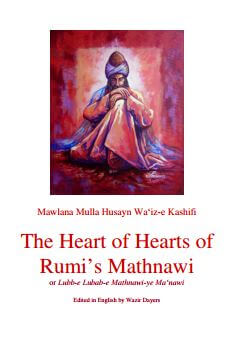Masnavi Maanvi by Maulana Rumi: A Study
Persian (Farsi) is regarded as language of beautiful verse and rich literature. It is no surprise that Persia witnessed some of the world’s greatest authors and poets, including heavyweight such as Hafiz, Saadi, Hakim Sinai and Attar to mention a few. Each of these gained immense popularity for writing ‘Masnavi’ couplets, basically two verses that end with rhyming words. Hafiz wrote Farsi Diwan, Sinai became famous for Hadiqa and Saadi’s Gulistan is even considered a textbook for fables with moral message. Such format of poetry provides more flexibility as not all the verses of poem need to rhyme with each other.
However, it is Rumi’s immortal Masnavi that unarguably remains the most admired, studied and recited Masnavi of all. It is manifested by the fact that Rumi’s verses are quoted all over internet and social media even today (despite many remaining unverified). In modern Persia (Iran), Rumi is called Balkhi (The Northern One), since he belonged to Northern Persia (now Turkey).
Rumi’s Masnavi is referred Masnavi Maanvi, which means Masnavi with Deeper Maa’na (meaning), as it narrates stories which has mystical and spiritual meanings.
Masnavi has 6 daftars or volumes, although per some researchers, Rumi also drafted the seventh volume. It is hard to verify but generally the former seems more authentic and we only see 6 volumes of book available.
Rumi was a true genius, not only for writing exceptional verse, but the way he concluded Masnavi, a long poem comprising over 50,000 verses. Rumi left it unfinished on purpose, since it was a revelation that will continue in hearts of Sufis. Masnavi, like other oriental masterpieces like Alif Laila, derived stories within stories hence it seems a never ending story.
Another interesting thing is the context of last story of Masnavi where Rumi left Masnavi opened ended. It is story of a father who had 3 sons and his last wish is that laziest of them gets his entire inheritance. The Qazi (Judge) calls all 3 and ask them to narrate an example that proves their sloth is of the greatest level, hence the rightful owner of entire inheritance.
However, the stories of Sons never begin (which also possibly can be a proof of laziness, as they cannot be bothered to speak!).
Nonetheless, we do see Sultan Walad’s plea to his father to complete the story, and lift the veil regarding who of the 3 sons for the bequest. However Rumi excused and says his time has arrived now and whoever has light is their heart, the Masnavi will enter in the person and reveal and continue its secrets. This is evident by his verse from last volume:
باقی این گفتہ آید بے زبان
درد دل ھر کس کہ دارد نور جهاں
Whoever is enlightened in their Inner Being
The remaining part of Masnavi will enter them by its self
Many authors, tried to continue Rumi Masnavi in the same vein, which is an attempt to validate the prediction of Rumi. Such works include works of Hazrat Ilajhi Baksh Kandhlvi and Maulana Shaykh Muhammad Thanvi.
However, my personal view is that such works lack the genius and elgence of Rumi’s narrative. Another reason TheSufi.com didn’t like annexing something to Rumi since I treat Masnavi as Ilhami Kitaab like Quran, a revelation that begins and ends with divine decree. Quran starts with ‘Alhamd o Lilla Rabialameen’ for a reason and doesn’t have a preface. So does Masnavi begins with ‘Listen to Reed’ and writing a preface poem or an ending is merely an attempt to please one ego, something that Professor Reynoldson did in his translation of Rumi.
One particular piece of literature that is not a continuation of Masnavi, but a beautiful related narrative is Iqbal Javed Nama. This is anothet work of Genius of Iqbal, inspired by Dante’s Divine Comedy, in which Iqbal makes Rumi his guide and travels many celestial worlds, heavens and hell and meet many notables. Iqbal, being a protege of Rumi, concludes Javed Nama in interesting manner. Although he ends with advice and prayers to Javed, his son, he doesn’t one particular gem of advice to Javed. He admits words fail him and only way for Javed to find this is to explore Iqbal footsteps and in the Aah-e-Seher (Words of prayers of spiritual connection at Fajr), as seen below:




